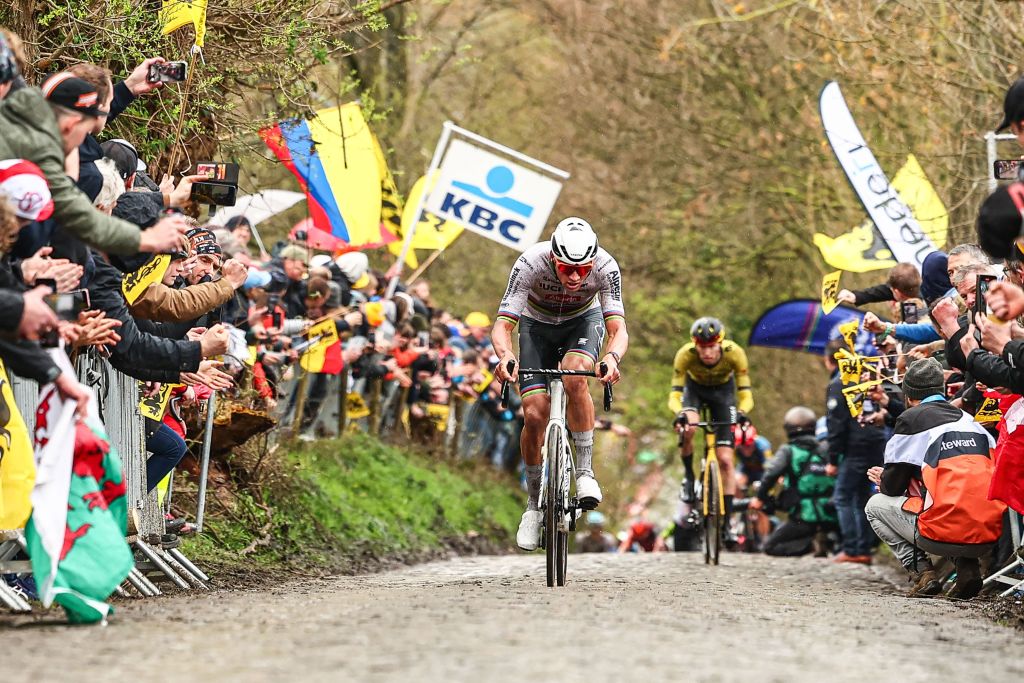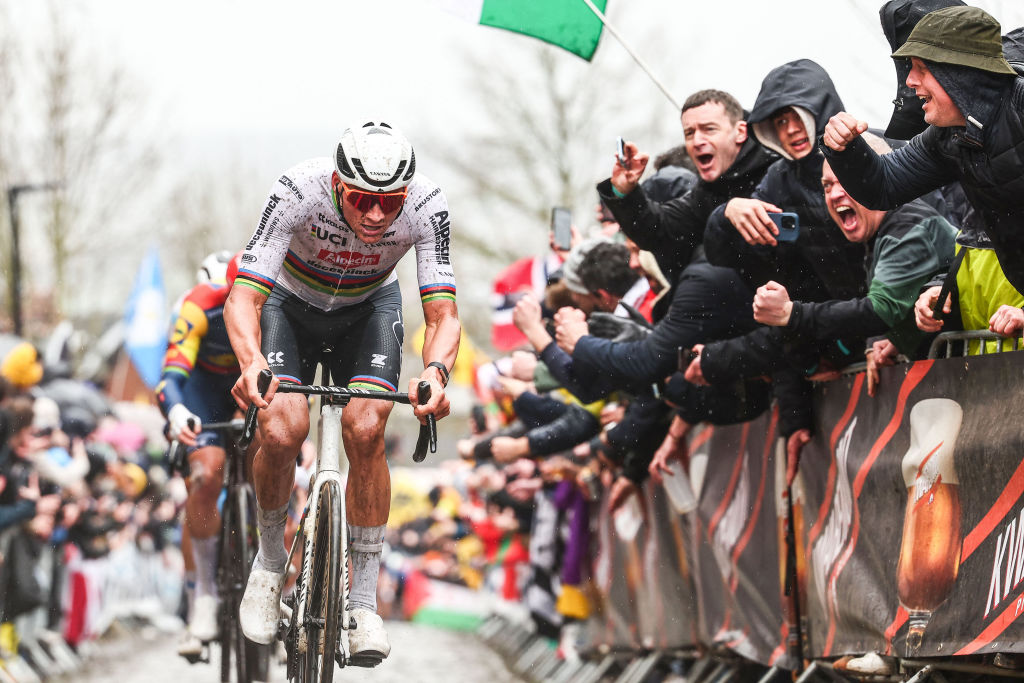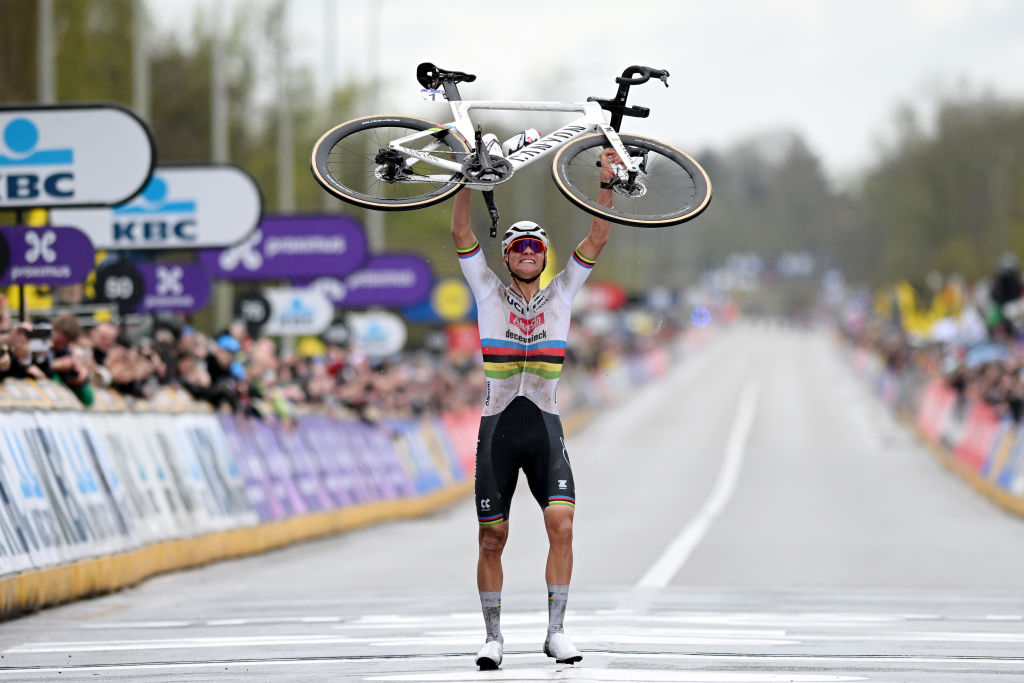'I knew the Koppenberg would be chaos' – Mathieu van der Poel conquers Tour of Flanders on toughest climb
Dutchman solo for 44km as he claims record-equalling third Ronde win

The Koppenberg hasn’t always smiled on Mathieu van der Poel. In November 2018, still a few months away from transferring his cyclocross talents to top-level racing on the road, the Dutchman endured a torrid afternoon on its slopes at the Koppenbergcross.
After lumbering home in 21st place, an almost unthinkable four minutes down on the day’s winner, Van der Poel could only shake his head in resignation. Even though he had won the race the year before, his relationship with the steep cobbled climb at its heart was always an uneasy one. “No,” Van der Poel said that afternoon. “This is not my climb.”
At the Tour of Flanders on Sunday, by contrast, the Koppenberg, like the race itself, belonged to Van der Poel alone. The combination of vertiginous gradient and rain-slicked cobbles forced almost the entire field to unclip and walk, but Van der Poel, inevitably, made light of the climb and the conditions, forging his record-equalling third Ronde victory on its slopes.
With a shade over 44km remaining, the world champion made what proved to be the race-winning attack by launching a seated acceleration on the steepest pitches of the Koppenberg. Behind, only Matteo Jorgenson (Visma-Lease A Bike) and Mads Pedersen (Lidl-Trek) made it up the climb without unclipping, but they were already competing in a different race to Van der Poel.
“I knew once it started raining that the Koppenberg would be chaos,” Van der Poel explained when he took a seat in the press conference afterwards. “When all the other teams started attacking us, I asked my team to create a controllable situation until the Koppenberg, because I knew from there I would be alone anyway. I think they did an amazing job.”
By his telling, Van der Poel hadn’t even intended to attack on the Koppenberg. But these days, in the midst of his imperial phase on the road, the Dutchman gives the disquieting impression that he is able to ride away from his rivals without even realising it. Once he glanced over his shoulder at the summit and saw he had a 10-second buffer over Jorgenson, the Alpecin-Deceuninck rider seemed to figure he might as well win it there and then.
“We’ve all seen the images of the Koppenberg from the past and what a chaos it is when it’s wet. And I also knew from cyclocross what it’s like when it’s a bit muddy there, so I knew it would be a crucial point,” Van der Poel said.
The latest race content, interviews, features, reviews and expert buying guides, direct to your inbox!
“I started in front at the steepest part of Koppenberg just to stay out of trouble. It was super slippery and really difficult to get traction there. It was not really the plan to be alone from there on, but yeah, there was no way back.”
Struggles

Seemingly condemned by his raw strength to attack from distance, Van der Poel quickly established an insurmountable lead over his pursuers. He had 24 seconds by the time he crested the Steenbeekdries, and that gap yawned out to a minute atop the Taaienberg. By that point, Van der Poel was no longer racing against his contemporaries, but against history itself as his lead inched towards the two-minute mark, a margin unseen since the days of Eddy Merckx.
There was, however, a mild sting in the tail for Van der Poel, whose efforts finally began to take their toll after he had hauled himself up the Kwaremont and Paterberg for the final time. For a moment, he even feared a hunger flat of the kind that saw his challenge unravel in the rain at the Yorkshire Worlds in 2019, but he righted himself beneath the deluge to reach Oudenaarde more than a minute clear.
“I was crawling towards the finish, I wasn’t even close to the powers I normally ride in the end,” Van der Poel said. “It makes me think a bit of Harrogate, to be honest. The circumstances were a bit the same. I was quite empty and that was maybe the hardest Ronde I’ve ever done.
“There were attacks from far, the first hour was quite fast, there were rainy conditions, we had to go full on every climb… It was a really hard one. I don’t think I was ever so happy to see the last kilometre.”
As well as the lingering threat of a fringale, Van der Poel had to negotiate an unruly home crowd on the Kwaremont, where he was doused in beer and jeered by some spectators, as he had been at the cyclocross in Hulst last winter. He shook off the incident when asked about it afterwards. “I was busy with winning the race,” he said, “so I couldn’t care less, to be honest.”
Record

Van der Poel lined up at this Tour of Flanders as the overwhelming favourite for victory, but the absence of the injured Wout van Aert arguably complicated his task here, given that the weight of controlling the peloton fell entirely on his Alpecin-Deceuninck team.
It proved to be a most unruly race, with contenders Jorgenson and Pedersen already tested the waters with 110km remaining, but the world champion never really looked like being outflanked. His flex on the Valkenberg, when he stitched the race back together with a solo effort, had the feel of an early admonishment to his rivals.
“We knew already other teams would start attacking from super far away,” Van der Poel said. “My team did a super job keeping it under control. That’s all I asked for today, because I knew at a certain point the strongest would have to battle it out.”
Van der Poel’s third Tour of Flanders victory sees him equal the record jointly held by Achiel Buysse, Fiorenzo Magni, Eric Leman, Johan Museeuw, Tom Boonen and Fabian Cancellara. The outright record looks firmly within the grasp of a man who has now placed on the Ronde podium five years in succession, and never finished lower than fourth. Next Sunday, meanwhile, Van der Poel has the chance to complete a Ronde-Roubaix double in the rainbow jersey, like Rik Van Looy in 1962.
“Records are not something that keep me occupied, my career is already way more than I would have expected,” Van der Poel said. “I’m really fucked right now, so it will take time to realise what I’ve done. It’s something I could never have dreamed, to win the Ronde as world champion. That’s something special.”
Get unlimited access to all of our coverage of the Spring Classics- including reporting, breaking news and analysis from the Paris-Roubaix, Tour of Flanders and more. Find out more.

Barry Ryan was Head of Features at Cyclingnews. He has covered professional cycling since 2010, reporting from the Tour de France, Giro d’Italia and events from Argentina to Japan. His writing has appeared in The Independent, Procycling and Cycling Plus. He is the author of The Ascent: Sean Kelly, Stephen Roche and the Rise of Irish Cycling’s Golden Generation, published by Gill Books.